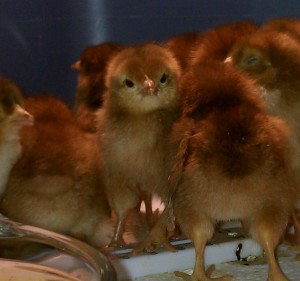 Several years ago I decided I wanted chickens. Live ones, living in the backyard. I had been moving my family to a more traditional lifestyle, and growing my own food and raising chickens were part of the deal. Maybe I should tell you right up front, though, that at the time we lived in a neighborhood. Have you ever thought about having pet chickens in the yard? Neither had my neighbor. Or my husband actually. I checked the statutes of my area and found that it was legal. As for approval from my hubby, he was tolerant of the idea…sort of.
Several years ago I decided I wanted chickens. Live ones, living in the backyard. I had been moving my family to a more traditional lifestyle, and growing my own food and raising chickens were part of the deal. Maybe I should tell you right up front, though, that at the time we lived in a neighborhood. Have you ever thought about having pet chickens in the yard? Neither had my neighbor. Or my husband actually. I checked the statutes of my area and found that it was legal. As for approval from my hubby, he was tolerant of the idea…sort of.
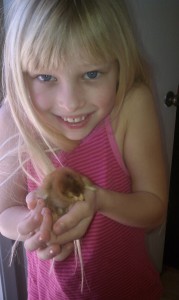 There is a lot to know about raising chicks, so I did much reading and preparing before they ever arrived. Two of my favorite resources were the website Back Yard Chickens, and the book Chicken Tractors by Andy Lee.
There is a lot to know about raising chicks, so I did much reading and preparing before they ever arrived. Two of my favorite resources were the website Back Yard Chickens, and the book Chicken Tractors by Andy Lee.
Our first batch of chicks were delivered through the United Postal Service. (Really!) We had a temporary home prepared for them in the laundry room, and we snuggled them in directly.
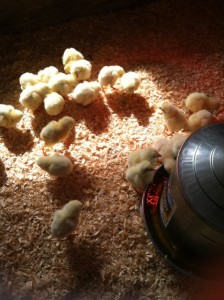 In these early days, baby chicks require much care, (mostly because they are messy and have to be cleaned up after very regularly,) but more importantly, they are so CUTE that you have to watch them for hours! And what is nature study beside observation? Anyway, it was February, and indoor nature study seemed much more inviting.
In these early days, baby chicks require much care, (mostly because they are messy and have to be cleaned up after very regularly,) but more importantly, they are so CUTE that you have to watch them for hours! And what is nature study beside observation? Anyway, it was February, and indoor nature study seemed much more inviting.
Shortly after these cuties got moved outside, my sister decided she would like some ducks for her pond. She bought an inexpensive incubator and ordered some eggs through the mail, but we did the incubating at my house. By this time I had figured out that this was a pretty neat school activity.
Some of the kids built an egg candler, which is used to shine a bright light through the egg to see what is happening on the inside. (Later, we found that the flash light setting on my smart phone works just as well.) This was a great nature study activity because we could track the development of the embryo. You cannot hold the light to the egg for long, because it’s important that you don’t change the temperature of the egg. Therefore, each child had to take a quick hard look, then put the egg back, before going to the table to draw what they had seen. We did weekly drawings like this in our nature study notebooks, and I think they came out wonderful. (Click on the picture below to look more closely.)
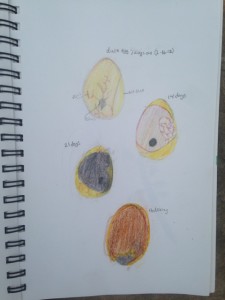
We did find that hatching ducks is harder than hatching chickens, and really requires a better quality incubator. I ended up having to help some of the duck get out of their shells at the end, which is a pretty precarious thing to do.
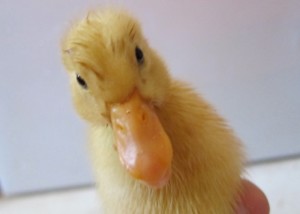
Over the years we have hatched several batches of chickens and ducks. I also got a batch of meat chicken by mail once, but that’s a whole other story! And most recently we hatched some Sebastopol geese. Geese are harder to incubate than ducks even, but my sister got a really nice incubator which we used for them. We also used eggs which her own geese had laid, and 5 out of 7 of them lived, which apparently is really good.
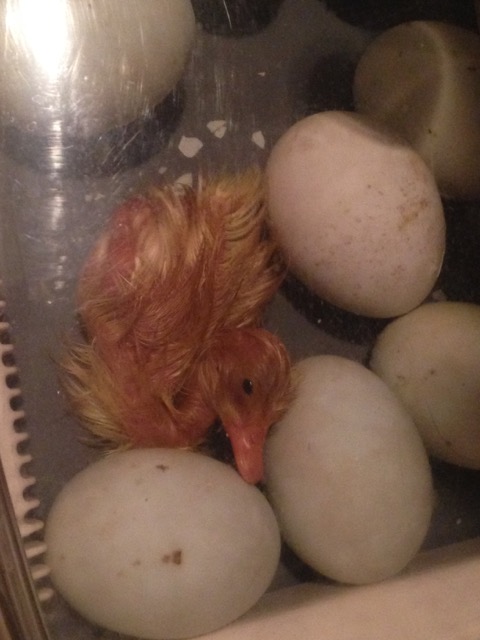
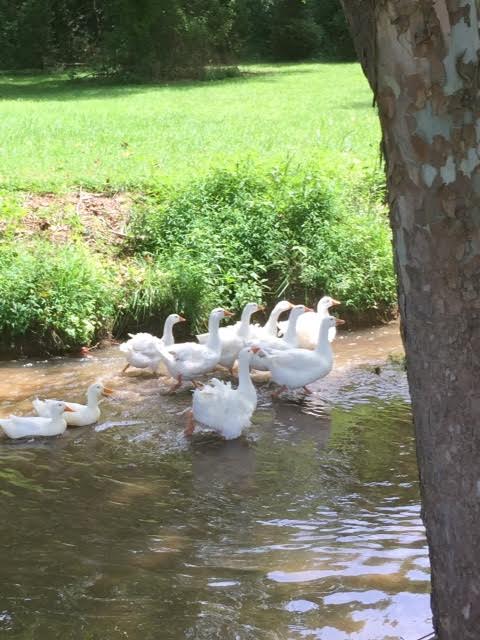
Whether you incubate some eggs, or just want to learn more about their development with your kids, I would suggest the following books:
For young children and early readers
Egg to Chick by Millicent Selsam (63 p.) This has excellent drawings which show embryonic development. There is an in-print version, but I haven’t been able to compare it with the original. Sometimes books are “revised” when they are reprinted, but you never want a revised version of a Selsam book.
Where do Chicks Come From by Amy Sklansky (LRFO1, IP)
Chickens Aren’t the Only Ones by Ruth Heller (PB, IP) Shows other animals that also lay eggs.
All About Eggs: and how they change into animals by Millicent Selsam. Another one that considers other animals that lay eggs.
Middle to upper elementary readers
A Chick Hatches by Joanna Cole and Jerome Wexler (47 p. with a medium amount of text on each page) This book includes photographs of embryonic development.
Science Projects With Eggs by David Webster
Middle School and up
Window Into an Egg: Seeing Life Begin by Geraldine Lux Flanagan
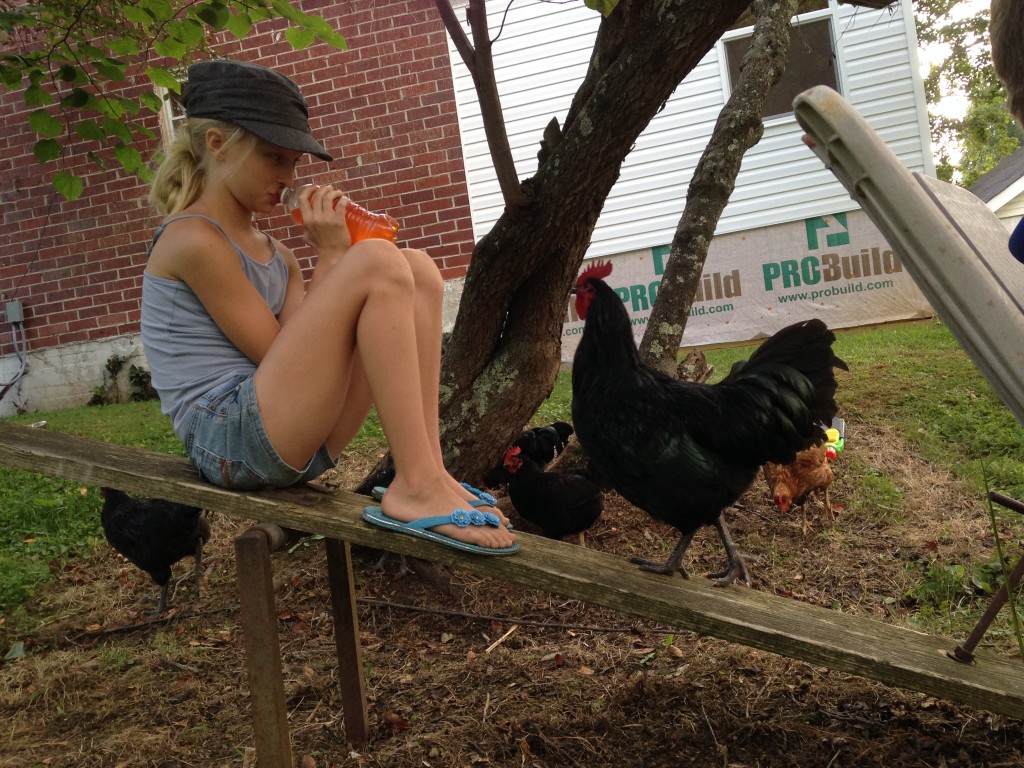
Thank you Kim B. for inspiring this post! I hope you and your family enjoy incubating your eggs.







Nicole,
Thanks for this post. Frankie has been having passion towards eggs and hatching, I almost thought about incubating, but assume that we can't keep chicken in our yard, which is very disappointing. But your post is very encouraging, maybe we could seek other solutions, eg: from a chicken farm.
This is sooo neat! What a great idea. I love taking a closer look at the drawings of the eggs.